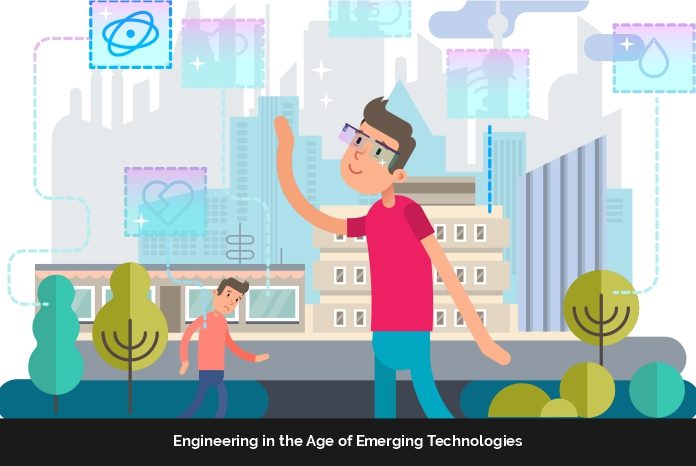The swift and relentless progress of emerging technologies within the field of engineering is orchestrating a profound transformation across diverse industries. Groundbreaking innovations such as the Internet of Things (IoT), Artificial Intelligence (AI), blockchain, Augmented Reality/Virtual Reality (AR/VR), and 3D printing are ushering in a new era where businesses have the opportunity to significantly augment their productivity and efficiency. These technologies are not just disrupting industries; they are revolutionizing the way we work, produce, and interact with the world.
Artificial Intelligence
Artificial Intelligence (AI) is like having a super-smart robot friend who can help solve problems and make decisions. It can learn from data, recognize patterns, make predictions, and understand human language. AI is changing the way we live, from chatbots that assist with food orders to self-driving cars.
Internet of Things (IoT)
IoT connects physical devices and sensors over the internet, transforming engineering in various sectors. IoT sensors monitor equipment in real-time, helping engineers detect issues before they become serious problems. IoT creates smart grids that improve energy efficiency and reduce waste. IoT sensors optimize traffic flow and management systems. IoT devices automate building systems, improving energy efficiency and reducing costs. IoT technology remotely monitors equipment and systems, allowing engineers to troubleshoot issues globally.
Nanotechnology
Nanotechnology manipulates materials on a nanoscale level, offering innovative possibilities. Creating new materials with unique properties like increased strength, flexibility, and conductivity. Developing energy storage and conversion technologies, including batteries and solar cells. Using nanoparticles for targeted drug delivery and imaging applications. Enhancing electronic devices like transistors and memory chips. Deploying nano-enabled water filtration systems to remove pollutants more effectively.
5G Technology
5G, which signifies the fifth generation of wireless technology, represents a significant advancement in mobile communications. In the evolution of mobile technology, 1G initially focused on voice calls, allowing people to use phones while on the go or away from their homes. 2G brought forth the capability for short text messaging. The emergence of 3G marked a pivotal moment by providing the necessary network speeds to introduce the very first smartphones. The advent of 4G LTE revolutionized mobile connectivity with its high data transfer rates, enabling smooth mobile video streaming and paving the way for a multitude of connected devices and location-based services that have become integral to our daily lives.
Blockchain
A blockchain can be defined as a distributed database that maintains an ever-expanding list of ordered records, referred to as “blocks.” These blocks are interconnected through cryptographic techniques, with each block containing a cryptographic hash of the preceding block, a timestamp, and transaction data. Essentially, a blockchain serves as a decentralized, distributed, and public digital ledger designed for recording transactions across a multitude of computers. This distributed nature ensures that the recorded information remains immutable, requiring the consensus of the network and the modification of all subsequent blocks to make any retroactive changes.
Challenges in Emerging Technologies in Engineering
The challenges inherent in emerging technologies not only present hurdles but also serve as fertile ground for progress and innovation. Engineers and technologists find themselves at the forefront of this transformative landscape, where they grapple with a multitude of critical issues. These encompass the seamless integration of cutting-edge solutions into existing ecosystems, guaranteeing robust security measures to protect sensitive data, tackling the complexities that arise from the interplay of various technologies, managing costs effectively, and navigating a complex web of regulations to ensure responsible and ethical deployment of these groundbreaking innovations.
Engineers are called upon to harness their creativity and problem-solving skills, devising solutions that not only overcome these obstacles but also pave the way for a future where technology enriches our lives while upholding ethical and moral standards. The journey to harness the full potential of emerging technologies is an intricate one, but it’s through the collective efforts of engineers and innovators that we can embrace the opportunities these challenges offer, ultimately shaping a brighter and more promising future.
Emerging technologies are poised to transform industries and drive innovation. From AI to 3D printing, these innovations enable engineers to design faster, more efficient, and sustainable products. Embracing these technologies unlocks a new era of progress in engineering.
Final Words
Emerging technologies like AI, robotics, IoT, nanotechnology, and AR/VR are revolutionizing engineering fields. Institutions like Bansal Institute of Science and Technology (BIST) are at the forefront, offering hands-on learning and real-world applications to explore the latest engineering trends. As engineering evolves, adapting to groundbreaking technologies is key to advancing in this dynamic field. Unlock the potential of emerging technologies by embracing innovation and seizing opportunities in engineering.





